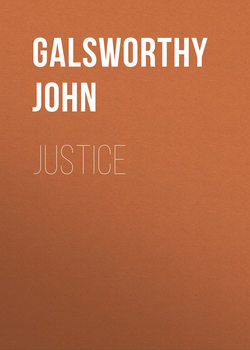Читать книгу Justice - Джон Голсуорси, Galsworthy John, Джон Голсуорси - Страница 4
ACT II
ОглавлениеA Court of Justice, on a foggy October afternoon crowded with barristers, solicitors, reporters, ushers, and jurymen. Sitting in the large, solid dock is FALDER, with a warder on either side of him, placed there for his safe custody, but seemingly indifferent to and unconscious of his presence. FALDER is sitting exactly opposite to the JUDGE, who, raised above the clamour of the court, also seems unconscious of and indifferent to everything. HAROLD CLEAVER, the counsel for the Crown, is a dried, yellowish man, of more than middle age, in a wig worn almost to the colour of his face. HECTOR FROME, the counsel for the defence, is a young, tall man, clean shaved, in a very white wig. Among the spectators, having already given their evidence, are JAMES and WALTER HOW, and COWLEY, the cashier. WISTER, the detective, is just leaving the witness-box.
CLEAVER. That is the case for the Crown, me lud!
Gathering his robes together, he sits down.
FROME. [Rising and bowing to the JUDGE] If it please your lordship and gentlemen of the jury. I am not going to dispute the fact that the prisoner altered this cheque, but I am going to put before you evidence as to the condition of his mind, and to submit that you would not be justified in finding that he was responsible for his actions at the time. I am going to show you, in fact, that he did this in a moment of aberration, amounting to temporary insanity, caused by the violent distress under which he was labouring. Gentlemen, the prisoner is only twenty-three years old. I shall call before you a woman from whom you will learn the events that led up to this act. You will hear from her own lips the tragic circumstances of her life, the still more tragic infatuation with which she has inspired the prisoner. This woman, gentlemen, has been leading a miserable existence with a husband who habitually ill-uses her, from whom she actually goes in terror of her life. I am not, of course, saying that it's either right or desirable for a young man to fall in love with a married woman, or that it's his business to rescue her from an ogre-like husband. I'm not saying anything of the sort. But we all know the power of the passion of love; and I would ask you to remember, gentlemen, in listening to her evidence, that, married to a drunken and violent husband, she has no power to get rid of him; for, as you know, another offence besides violence is necessary to enable a woman to obtain a divorce; and of this offence it does not appear that her husband is guilty.
JUDGE. Is this relevant, Mr. Frome?
FROME. My lord, I submit, extremely – I shall be able to show your lordship that directly.
JUDGE. Very well.
FROME. In these circumstances, what alternatives were left to her? She could either go on living with this drunkard, in terror of her life; or she could apply to the Court for a separation order. Well, gentlemen, my experience of such cases assures me that this would have given her very insufficient protection from the violence of such a man; and even if effectual would very likely have reduced her either to the workhouse or the streets – for it's not easy, as she is now finding, for an unskilled woman without means of livelihood to support herself and her children without resorting either to the Poor Law or – to speak quite plainly – to the sale of her body.
JUDGE. You are ranging rather far, Mr. Frome.
FROME. I shall fire point-blank in a minute, my lord.
JUDGE. Let us hope so.
FROME. Now, gentlemen, mark – and this is what I have been leading up to – this woman will tell you, and the prisoner will confirm her, that, confronted with such alternatives, she set her whole hopes on himself, knowing the feeling with which she had inspired him. She saw a way out of her misery by going with him to a new country, where they would both be unknown, and might pass as husband and wife. This was a desperate and, as my friend Mr. Cleaver will no doubt call it, an immoral resolution; but, as a fact, the minds of both of them were constantly turned towards it. One wrong is no excuse for another, and those who are never likely to be faced by such a situation possibly have the right to hold up their hands – as to that I prefer to say nothing. But whatever view you take, gentlemen, of this part of the prisoner's story – whatever opinion you form of the right of these two young people under such circumstances to take the law into their own hands – the fact remains that this young woman in her distress, and this young man, little more than a boy, who was so devotedly attached to her, did conceive this – if you like – reprehensible design of going away together. Now, for that, of course, they required money, and – they had none. As to the actual events of the morning of July 7th, on which this cheque was altered, the events on which I rely to prove the defendant's irresponsibility – I shall allow those events to speak for themselves, through the lips of my witness. Robert Cokeson. [He turns, looks round, takes up a sheet of paper, and waits.]
